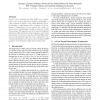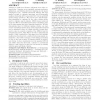229 search results - page 29 / 46 » Evaluation measures for preference judgments |
ICWE
2003
Springer
14 years 1 months ago
2003
Springer
In this paper we propose to include two up-to-date separate concepts, namely social computing and usability metrics, in intelligent interaction agents to enhance a user-centred, ad...
WWW
2005
ACM
14 years 9 months ago
2005
ACM
A search engine evaluation model that considers over seventy performance and feature parameters is presented. The design of a web-based system that allows the user to tailor the m...
IPTPS
2004
Springer
14 years 1 months ago
2004
Springer
A protocol for a distributed hash table (DHT) incurs communication costs to keep up with churn—changes in membership—in order to maintain its ability to route lookups efficie...
CIKM
2011
Springer
12 years 8 months ago
2011
Springer
Meaningful evaluation of web search must take account of spam. Here we conduct a user experiment to investigate whether satisfaction with search engine result pages as a whole is ...
KDD
2008
ACM
14 years 8 months ago
2008
ACM
Learning to rank from relevance judgment is an active research area. Itemwise score regression, pairwise preference satisfaction, and listwise structured learning are the major te...


